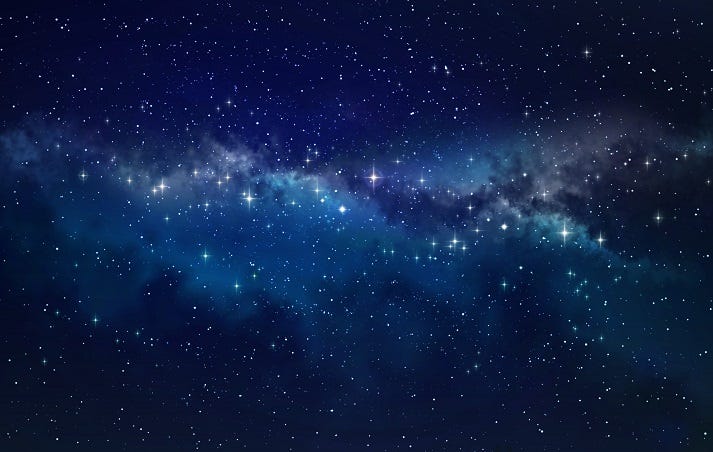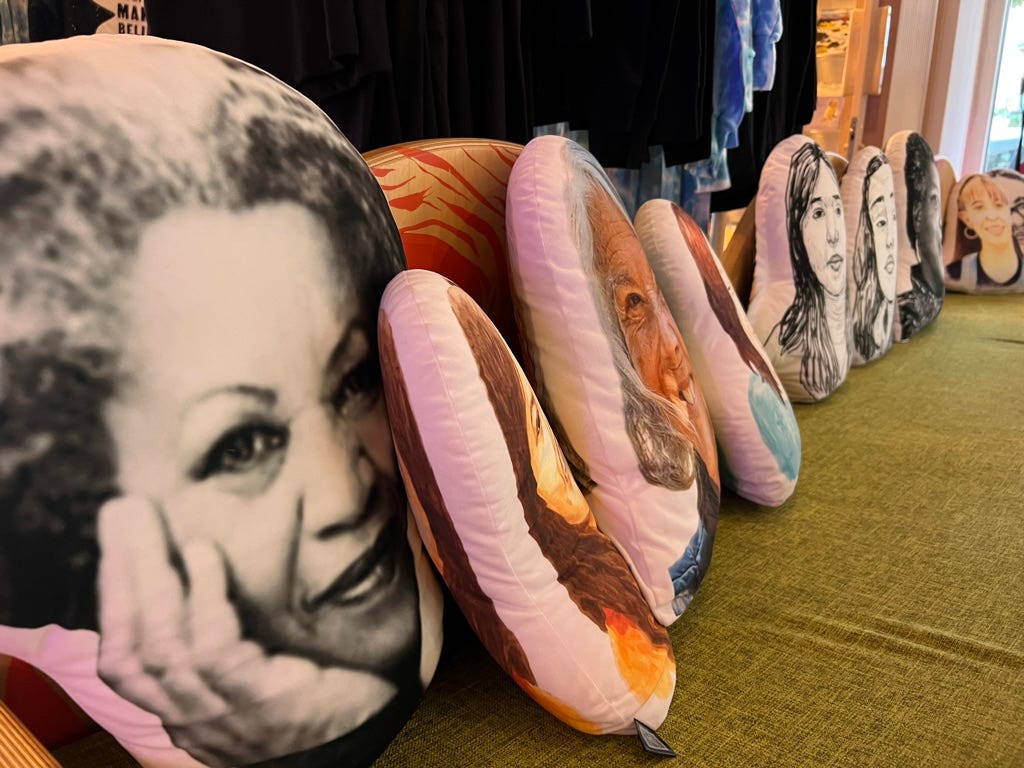I’m afraid I didn’t feel like writing this newsletter today. I almost didn’t. You can probably guess the reasons why.
But then a friend sent me this quote by Hannah Arendt from The Human Condition:
“The smallest act in the most limited circumstances bears the seed of … boundlessness, because one deed, and sometimes one word, suffices to change every constellation.”
I’ve been remembering the 2016 election this week. I was the Executive Director at National Novel Writing Month, which draws thousand of writers every November, and it was disturbing to watch writers’ stories literally collapse the day after Trump won in 2016. We had more writers than ever drop out that year. But it wasn’t only NaNoWriMo writers. Many of my friends, professional writers, stopped writing. They were traumatized. They were depressed.
I always say that I don’t believe in writer’s block, but writing is difficult, and sometimes impossible, for a battered brain. Trauma and depression turn off the spigot of creativity.
So I’m not writing to coax or cajole anyone to keep writing—because the election results are traumatic to some, and have legitimately depressed many, and it’s important to recognize trauma and depression and not force words onto the page.
At the same time, the reason I decided to write this newsletter is that we need to believe in the possibilities of our stories—and believe that our stories make a difference—because we need the truth and beauty of our words more so now than ever.
How art can deliver us
It’s easy to think that our art is trivial when it’s up against such a menacing and malevolent block of history as we’re living through, but the opposite is actually true: our art isn’t trivial; it’s what can deliver us.
James Baldwin expressed the importance of the role of the artist better than I can:
“You think your pain and your heartbreak are unprecedented in the history of the world, but then you read. It was Dostoevsky and Dickens who taught me that the things that tormented me most were the very things that connected me with all the people who were alive, or who ever had been alive. Only if we face these open wounds in ourselves can we understand them in other people. An artist is a sort of emotional or spiritual historian. His role is to make you realize the doom and glory of knowing who you are and what you are. He has to tell, because nobody else can tell, what it is like to be alive.”
An artist is a sort of emotional or spiritual historian.
Ponder this the next time you sit down to write. It doesn’t matter if you’re writing a sci-fi novel, a poem, a journal entry, or a kid’s book. We are the seers, the tellers—this is our role, our responsibility—to attune our overly sensitive writerly radar to the world—to recognize how irony has flipped stories throughout time—to recognize the portals of possibility that will open— because those portals have opened in every era.
“Poets are the unacknowledged legislators of the world,” said Percy Bysshe Shelley.
And the legislation poets write allows us to feel, to think, to touch, to witness, to create, to … rebel.
To create is an act of rebellion:
“Art is fueled by rebellion: the need, in some amounting to obsessions, to resist what is, to defy one's elders, even to the point of ostracism; to define oneself, and by extension one's generation, as new, novel, ungovernable,” said Joyce Carol Oates.
Try to imagine a crucial cultural turning point without art to represent it.
Or, no, try to imagine a crucial cultural turning point without art to lead it.
Think back to the books that were on a bookstore’s shelves 100 years ago and compare them to the books you’ll find now. Sure, we’re still dealing with systemic biases, and things are far from perfect in our book world, but we also have stories by writers of color, LGBTQ+ authors, disabled authors—stories that were absent throughout most of our nation’s history.
Our stories shape our world in more fundamental ways than any public policy, but people want to take those stories off the shelves. The number of unique titles challenged shattered last year’s records. A record 4,240 unique book titles were targeted for censorship in 2023, a 65% increase over the 2,571 unique titles targeted in 2022.
As Rebecca Solnit tweeted after the election, “They want you to feel powerless and surrender and let them trample everything and you are not going to let them. You are not giving up, and neither am I. The fact that we cannot save everything does not mean we cannot save anything and everything we can save is worth saving.”
The kindness every era holds
Let’s not only save books. Let’s write new ones.
Exploring the human condition is not beside the point in dire times like this; it’s the point. By writing not only are you putting your story into the world, you’re a role model to others to do so.
Howard Zinn’s words provided me a lot of hopefulness—because we need to see the “compassion, sacrifice, courage, kindness” that is part of every era.
“To be hopeful in bad times is based on the fact that human history is not only of cruelty, but also of compassion, sacrifice, courage, kindness. If we see only the worst, it destroys our capacity to do something. If we remember those times and places where people have behaved magnificently, this gives us the energy to act. And if we do act, in however small a way, we don't have to wait for some grand Utopian future. The future is an infinite succession of presents, and to live now as we think human beings should live, in defiance of all that is bad around us, is itself a marvelous victory.”
Let us all celebrate our need to pen stories, our need to feel deeply, our need to be in service to our stories. Think of those words: to be in service to your story. It’s bigger than you. Your story is part of the constellations of our world.
For me personally, I’m on a quest to understand all of the many vagaries of love. I want to find a way to write with love, to bring love into every conversation I have. I wrote about that in my last newsletter: Writing and Love. Love and Writing. I will write a lot more about that.
I hope the quotes below help you to be in service to your story and to fuel your creative spirit.
Please contribute your spare change to help me publish this newsletter.
Malala Yousafzai
“One child, one teacher, one book, one pen can change the world.”
Elie Wiesel
“Silence encourages the tormentor, never the tormented.”
Rebecca Solnit
“Writing is saying to no one and to everyone the things it is not possible to say to someone. Or rather writing is saying to the no one who may eventually be the reader those things one has no someone to whom to say them.”
James Baldwin
“Artists are here to disturb the peace.”
Sorry, this one is by me (from Pep Talks for Writers)
“An artist is by definition a menace to conformity. The underlying purpose of deciding to write is to bring forth this mysterious and sacred gift within ourselves, to touch, revere, and express the truth of the way we see this crazy world. If you put your story in a cage of others’ rules, your imagination will always reside behind bars.
“… The imagination is always subversive. It’s always seeking to know reality, take it further, transform it. Steel yourself to be resilient, defiant, and cunning.”
Dean Young
“We are making birds, not birdcages.”
Walt Whitman
“There is no week nor day nor hour when tyranny may not enter upon this country, if the people lose their roughness and spirit of defiance.”
Edward Abbey
“One single act of defiance against power, against the State that seems omnipotent but is not, transforms and transfigures the human personality. At least for a time. For a while. Perhaps that is enough.”
Vincent Van Gogh
“I can very well, in life and in painting, too, do without God. But I cannot, suffering as I do, do without something that is greater than I am, that is my life—the power to create.”
Ai Weiwei
“My favorite word? It’s ‘act.’”
Twyla Tharp
“Creativity is an act of defiance.”
Diego Rivera
“The role of the artist is that of the soldier of the revolution.”
Theaster Gates
“I am invested in illustrating the possible.”
Albert Camus
“Art is the activity that exalts and denies simultaneously. ‘No artist tolerates reality,’ says Nietzsche. That is true, but no artist can get along without reality. Artistic creation is a demand for unity and a rejection of the world. But it rejects the world on account of what it lacks and in the name of what it sometimes is. Rebellion can be observed here in its pure state and in its original complexities. Thus art should give us a final perspective on the content of rebellion.”
Philippe Petit
“There is a certain rebellion when you are an artist at heart, even if only in the art of living.”
Toni Morrison
“This is precisely the time when artists go to work. There is no time for despair, no place for self-pity, no need for silence, no room for fear. We speak, we write, we do language. That is how civilizations heal."
Osho
“Creativity is the greatest rebellion in existence.”
James Baldwin again
“This is the only real concern of the artist, to recreate out of the disorder of life that order which is art.”





I'm amazed at how someone who just didn't feel like writing this newsletter produced such a robust, thought-filled piece! Thank you for your inspiring words (and all quotes - love them) at just the right time.
One of your best, Grant. I've already passed it along to writer friends and will be borrowing those quotes. Thank you. For me, you hit the emotional nail on the head. I've been struggling with purpose.